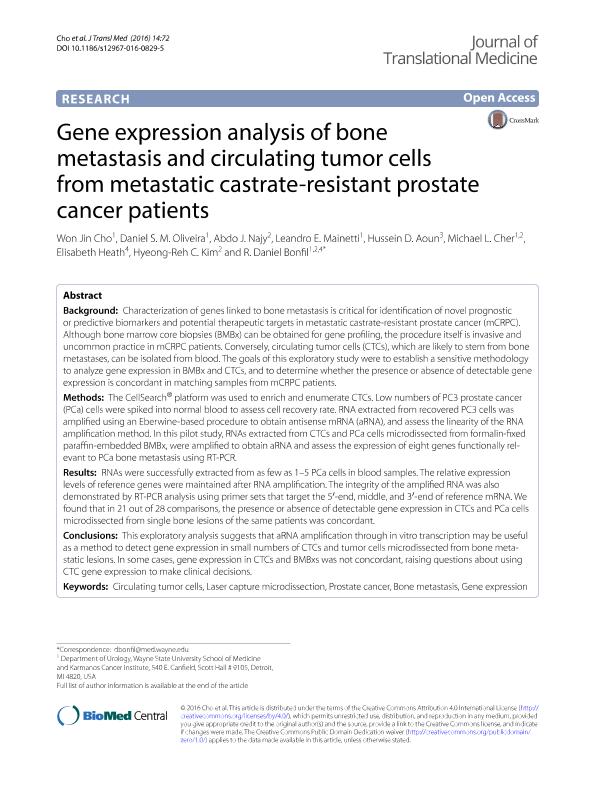Artículo
Gene expression analysis of bone metastasis and circulating tumor cells from metastatic castrate-resistant prostate cancer patients
Cho, Won Jin; Oliveira, Daniel S.M.; Najy, Abdo J.; Mainetti, Leandro Ernesto ; Aoun, Hussein D.; Cher, Michael L.; Heath, Elisabeth; Kim, Hyeong-Reh C.; Bonfil, Ricardo Daniel
; Aoun, Hussein D.; Cher, Michael L.; Heath, Elisabeth; Kim, Hyeong-Reh C.; Bonfil, Ricardo Daniel
 ; Aoun, Hussein D.; Cher, Michael L.; Heath, Elisabeth; Kim, Hyeong-Reh C.; Bonfil, Ricardo Daniel
; Aoun, Hussein D.; Cher, Michael L.; Heath, Elisabeth; Kim, Hyeong-Reh C.; Bonfil, Ricardo Daniel
Fecha de publicación:
03/2016
Editorial:
BioMed Central
Revista:
Journal Of Translational Medicine
ISSN:
1479-5876
Idioma:
Inglés
Tipo de recurso:
Artículo publicado
Clasificación temática:
Resumen
Background: Characterization of genes linked to bone metastasis is critical for identification of novel prognostic or predictive biomarkers and potential therapeutic targets in metastatic castrate-resistant prostate cancer (mCRPC). Although bone marrow core biopsies (BMBx) can be obtained for gene profiling, the procedure itself is invasive and uncommon practice in mCRPC patients. Conversely, circulating tumor cells (CTCs), which are likely to stem from bone metastases, can be isolated from blood. The goals of this exploratory study were to establish a sensitive methodology to analyze gene expression in BMBx and CTCs, and to determine whether the presence or absence of detectable gene expression is concordant in matching samples from mCRPC patients. Methods: The CellSearch® platform was used to enrich and enumerate CTCs. Low numbers of PC3 prostate cancer (PCa) cells were spiked into normal blood to assess cell recovery rate. RNA extracted from recovered PC3 cells was amplified using an Eberwine-based procedure to obtain antisense mRNA (aRNA), and assess the linearity of the RNA amplification method. In this pilot study, RNAs extracted from CTCs and PCa cells microdissected from formalin-fixed paraffin-embedded BMBx, were amplified to obtain aRNA and assess the expression of eight genes functionally relevant to PCa bone metastasis using RT-PCR. Results: RNAs were successfully extracted from as few as 1-5 PCa cells in blood samples. The relative expression levels of reference genes were maintained after RNA amplification. The integrity of the amplified RNA was also demonstrated by RT-PCR analysis using primer sets that target the 5'-end, middle, and 3'-end of reference mRNA. We found that in 21 out of 28 comparisons, the presence or absence of detectable gene expression in CTCs and PCa cells microdissected from single bone lesions of the same patients was concordant. Conclusions: This exploratory analysis suggests that aRNA amplification through in vitro transcription may be useful as a method to detect gene expression in small numbers of CTCs and tumor cells microdissected from bone metastatic lesions. In some cases, gene expression in CTCs and BMBxs was not concordant, raising questions about using CTC gene expression to make clinical decisions.
Archivos asociados
Licencia
Identificadores
Colecciones
Articulos(CCT - ROSARIO)
Articulos de CTRO.CIENTIFICO TECNOL.CONICET - ROSARIO
Articulos de CTRO.CIENTIFICO TECNOL.CONICET - ROSARIO
Citación
Cho, Won Jin; Oliveira, Daniel S.M.; Najy, Abdo J.; Mainetti, Leandro Ernesto; Aoun, Hussein D.; et al.; Gene expression analysis of bone metastasis and circulating tumor cells from metastatic castrate-resistant prostate cancer patients; BioMed Central; Journal Of Translational Medicine; 14; 1; 3-2016; 1-12
Compartir
Altmétricas



